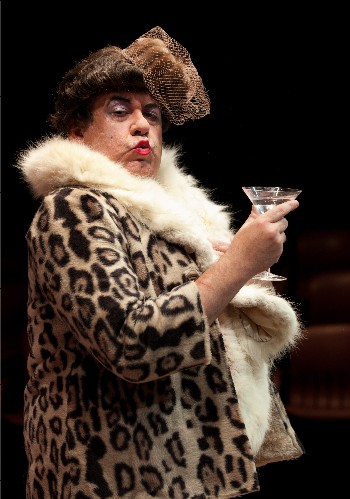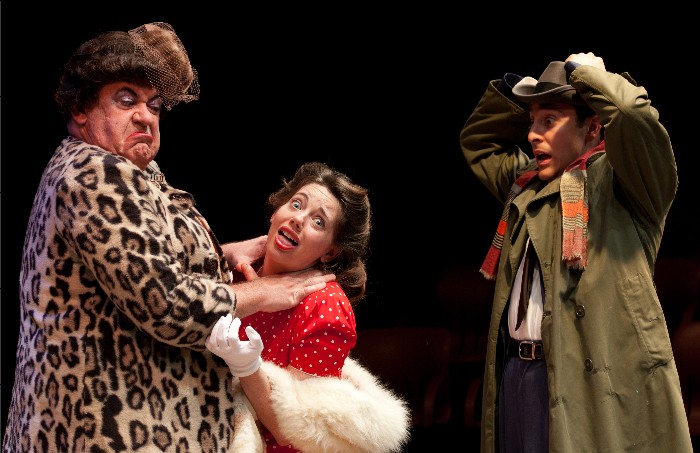Fuse Theater Review: A Mildly Amusing “Third Story”
There are a number of amusing moments when playwright Charles Busch makes effective use of his gift for exaggerated wit and whimsy—no dramatist can drop the word “canasta” with as much hilarious finesse.
The Third Story by Charles Busch. Directed by Adam Zahler. Staged by the Titanic Theatre Company at the Arsenal Center for the Arts, Black Box, Watertown, MA, through August 18.
By Bill Marx.

Rick Park (Queenie) beckons in Titanic Theatre Company’s production of THE THIRD STORY. Photo: Evgenia Eliseeva.
Camp farceur Charles Busch has become more ambitious as a dramatist since the days of Vampire Lesbians of Sodom and Psycho Beach Party, a hunger for intellectual respectability that may have been accelerated by the Broadway success of The Tale of the Allergist’s Wife in 2000. His early comedies, firmly in the Charles Ludlum mode, were zany explosions of high fashion and low gags, exhilarating send-ups of B-grade films and stage melodramas that, through the dexterous use of drag, cornball comedy (of the gay and straight variety), and cartoon pratfalls, reveled in a good-natured silliness that was an end in itself.
First produced in 2008, The Third Story provides giggles in the generally shipshape maiden voyage of the Titanic Theatre Company, especially with Rick Park, in drag, playing a no nonsense, female mob boss and a Russian, fairy tale witch smothered in schmattahs. But this time around, the movie and theater parodies are supposed to add up to something more than hilarity, and the need to connect the archetypal dots in a sentimental fade out (which we are to take in earnest) thins out the humor in the anarchistic antics. In this outing, alas, the fun is supposed to add up to something.
Set in the late ’40s/early ’50s, the frame story gives us a veteran woman screenwriter, Peg, down on her luck, reuniting with her estranged son, Drew, who has also written for the big screen but is now content to be a mail deliverer in Omaha. Peg has an idea for a script, Republic Studios (one of junkiest of the era) likes what it has heard so far, but she has writer’s block and Communist connections: she needs help from her kid to complete the screenplay. We see the various threads of Peg’s script intersect as the pair work them out: one storyline has an ailing kingpin of crime, Queenie, trying to pry her beloved son, Steve, away from Verna, his untrustworthy fiance, another features the comeuppance of a repressed, female mad scientist, Dr. Constance Hudson, who can create duplicate human beings, including a misfire named Zygote, and a Firebird retread gives us a young woman named Vasalisa, who, with the magic of Baba Yaga, conjures up an ideal double to woo the Prince. Once he has been won, the original version schemes to slide into his bed.
Meanwhile, Peg and Drew hash out their troubled past, with various alternative versions of the son’s birth flying by until we arrive at Peg’s “third story”—the version of a screenplay that brings it all home. The idea is that regarding mother/son relations, the “right” fiction may as well be the truth.

Rick Park (Queenie), Erin Eva Butcher (Verna) and Jordan Sobel (Steve) are having a disagreement the Titanic Theatre Company’s production of THE THIRD STORY. Photo courtesy: Evgenia Eliseeva.
The parodies reflect/heal the rough-and-tumble mother/son conflict by way of the notion of duality—references to Dostoevsky’s story “The Double” run throughout the play. Peg and Drew double as a number of the characters, many of whom have two sides, are cut in two, or are cloned. Camp itself could be defined as taking opposite attitudes toward whatever marginal cultural artifact is to be lovingly raked over the coals (“Of course it’s bad, but it’s wonderfully bad”). A lot of the time the various dualities are played for laughs in the script, and there are plenty of enjoyable moments when Busch makes effective use of his exaggerated wit and whimsy—no dramatist can drop the word “canasta” with as much hilarious finesse. Yet ultimately the Jungian (?) stew of contrasts becomes muddled: the story strands are insufficiently nourished, both in terms of dramatic tension and comic detail (the Baba Yaga episodes are skeletal), and the play feels stretched out for the sake of an ending in which a son’s love for his mother is celebrated with far too straight a face.
Before the uplift, The Third Story supplies some comic compensations, especially via the nimble minimalist staging supplied by director Adam Zahler. Park plays Queenie the crime boss with a deft, sarcastic snarl, adding some delightful moments of improv, while his Baba Yaga proffers a brusque, hangdog charm. The promising Brett Milanowksi brings some admirably daffy energy to Zygote, as well as a sharp gift for broad physical comedy. Given his impressive comic chops, Milanowski is a young performer to watch. The other members of the cast—Shelley Brown as Peg, Alisha Jansky as the lovelorn scientist, Erin Eva Butcher as Verna, and Jordan Sobel as Drew—are game, if sometimes a bit listless and/or one note. Brown and Sobel never make the mother/son frame story more than emotionally perfunctory, and the quartet sometimes strain to be funny.
Still, The Third Story serves up some pleasing entertainment with its wild send-ups, and the script, while uneven, suggests that Busch—by attempting to make his trademark showbiz parodies double as guides to psychological revelation—is in transition as a playwright. It will take him a few more stabs (probably more than three) to arrive at the proper balance of silliness and significance.
